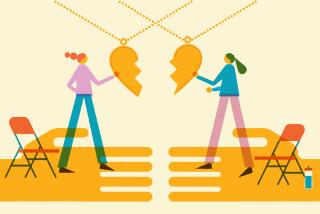‘Emotions Anonymous’ Draws Doctors’ Praise
- Share via
ST. PAUL, Minn. — Before she joined Emotions Anonymous, Linda Funkhouser weighed 350 pounds, cried for no apparent reason and moped around her house muttering about people who she felt had slighted her.
Since joining the group 15 months ago, Funkhouser has a ready smile for newcomers at the weekly meeting she helps run. Her weight has dropped to 175 pounds and she credits the meetings with giving her a new lease on life.
“I’m 37, but I feel like a kid,” said Funkhouser, who recalls being so depressed about her weight and relatives’ hurtful comments that she contemplated suicide.
“I couldn’t cope with living day to day,” she said.
Enjoying Life
With the group helping her get a handle on runaway emotions, she says she is able to enjoy simple pleasures she missed as an overweight teen-ager.
“I’ve got a (Minnesota) Twins T-shirt I wear to my workout. Never in my life had I worn a T-shirt,” Funkhouser said. “And you know what, sometimes I flip (over rock ‘n’ roll videos).”
Discussion in meetings focuses on a 12-step guide to improving members’ outlook and lives. The program of recovery, patterned after Alcoholics Anonymous, emphasizes spiritual growth and shared experience of members.
Since EA was founded in St. Paul in 1971 to help people confront their depression, anxiety and anger, the organization has grown to 1,400 chapters in 21 countries.
“It has been a very positive force in the self-help movement,” said John M. Blamphin, a spokesman for the American Psychiatric Assn.
Agoraphobia, Panic
The St. Paul woman who founded EA after suffering from agoraphobia and panic attacks for 40 years was invited to tell her story at the psychiatrists’ annual convention last year.
“I felt as if I was on a train going down the tracks with no brakes, and I didn’t know how to stop,” 76-year-old “Marion” recalled.
She said her initial inspiration for forming a support group came when she attended a meeting of Al-Anon, a group for relatives and loved ones of alcoholics.
The Rev. Robert Mader is a Protestant chaplain at the Minnesota Correctional Facility at St. Cloud, where EA meetings are held for inmates.
“EA is only beginning to become accepted as part of the treatment setting. We’re only just breaking ground,” he said.
Saw Program Work
Funkhouser said her life began to turn around when she saw how other members had improved. “I could see there was hope,” she said.
Not everyone reaches that point.
“We have had people who want to moan,” Funkhouser said, but members try to tactfully help the complainers shift attention from their problems toward solutions.
Unlike many counselors or psychologists, EA members don’t give advice about personal or family problems during meetings, although they do provide an informal support system, she said.
Group members believe the key to handling emotional difficulties lies in learning to cope with their source, such as an overly critical parent, Funkhouser said.
There are no fees for membership. Groups are self-supported through members’ donations. Publications about EA are sold to hospitals and other social service agencies.
Doctors Consulted
Prospective members are urged to check with physicians first to make sure there is no physical cause for their problems, said Diane Hanson, the organization’s coordinator.
Mental patients often are advised to attend EA meetings when they’re released from institutions, she said. “It’s comforting to the person to know when they leave the hospital that they have a group to go to.”
One psychiatrist who refers patients to EA says the organization can help many people who suffer from neuroses, phobias and depression.
“I have seen some really dramatic results with my patients who have gone there and have followed up,” said James T. Garvey, medical director of crisis services at North Memorial Medical Center in suburban Robbinsdale.
“It’s not for people who are mentally ill, but who are emotionally sick.”
More to Read
Sign up for Essential California
The most important California stories and recommendations in your inbox every morning.
You may occasionally receive promotional content from the Los Angeles Times.













